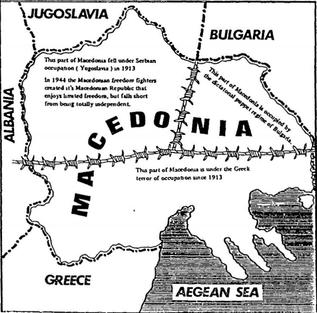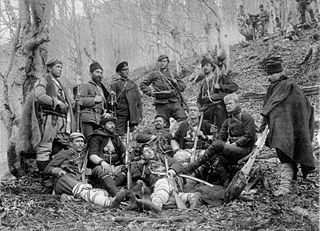Related Research Articles

Vardar Macedonia was the name given to the territory of the Kingdom of Serbia (1912–1918) and Kingdom of Yugoslavia (1918–1941) roughly corresponding to today's North Macedonia. It covers the northwestern part of geographical Macedonia, whose modern borders came to be defined by the mid-19th century.

Aegean Macedonia is a term describing the region of Macedonia in Northern Greece. It is currently mainly used in the Republic of North Macedonia, including in the irredentist context of a United Macedonia. The term is also used in Bulgaria as the more common synonym for Greek Macedonia, without the connotations it has in the Republic of North Macedonia. The term has no circulation in Greece, since Aegean usually refers to the Greek islands or to strictly Greek coastal areas with direct access to the Aegean Sea. Although Greek Macedonia does have its coastline along the northern Aegean, the province is more than anything else dominated by its high mountain ranges and broad, grassy plains, rather than by its coastline.

Firewalking is the act of walking barefoot over a bed of hot embers or stones. It has been practiced by many people and cultures in many parts of the world, with the earliest known reference dating from Iron Age India c. 1200 BCE. It is often used as a rite of passage, as a test of strength and courage, and in religion as a test of faith.

Sacred dance is the use of dance in religious ceremonies and rituals, present in most religions throughout history and prehistory. Its connection with the human body and fertility has caused it to be forbidden by some religions; for example, some branches of Christianity and Islam have prohibited dancing. Dance has formed a major element of worship in Hindu temples, with strictly formalized styles such as Bharatanatyam, which require skilled dancers and temple musicians. In the 20th century, sacred dance has been revived by choreographers such as Bernhard Wosien as a means of developing community spirit.

The existence and distinctiveness of the Macedonian language is disputed in Bulgaria and the name of the language was disputed by Greece. By signing the Prespa Agreement, Greece accepted the name "Macedonian language" in reference to the official language of North Macedonia.

United Macedonia, or Greater Macedonia, is an irredentist concept among Macedonian nationalists that aims to unify the transnational region of Macedonia in Southeastern Europe into a single state that would be dominated by ethnic Macedonians. The proposed capital of such a United Macedonia is the city of Thessaloniki, the capital of Greek Macedonia, which ethnic Macedonians and the Yugoslav leader Josip Broz Tito had planned to incorporate into their own states.

Macedonian nationalism is a general grouping of nationalist ideas and concepts among ethnic Macedonians that were first formed in the late 19th century among separatists seeking the autonomy of the region of Macedonia from the Ottoman Empire. The idea evolved during the early 20th century alongside the first expressions of ethnic nationalism among the Slavs of Macedonia. The separate Macedonian nation gained recognition during World War II when the Socialist Republic of Macedonia was created as part of Yugoslavia. Macedonian historiography has since established links between the ethnic Macedonians and various historical events and individual figures that occurred in and originated from Macedonia, which range from the Middle Ages up to the 20th century. Following the independence of the Republic of Macedonia in the late 20th century, issues of Macedonian national identity have become contested by the country's neighbours, as some adherents to aggressive Macedonian nationalism, called Macedonism, hold more extreme beliefs such as an unbroken continuity between ancient Macedonians, and modern ethnic Macedonians, and views connected to the irredentist concept of a United Macedonia, which involves territorial claims on a large portion of Greece and Bulgaria, along with smaller regions of Albania, Kosovo and Serbia.

Tolly Burkan, also known as Bruce Burkan, is a firewalker and former magician. He is part of the Human Potential Movement. He is also the founder of the Firewalking Institute of Research and Education.

The Anastenaria, is a traditional barefoot fire-walking ritual with ecstatic dance performed in some villages in Northern Greece and Southern Bulgaria. The communities which celebrate this ritual are descended from refugees who entered Greece from Eastern Thrace following the Balkan Wars of 1911–12 and the Population exchange between Greece and Turkey in 1923.

Andon Kalchev was a Bulgarian army officer, one of the leaders of the Bulgarian-backed Ohrana, a paramilitary formation of Bulgarians in Greek Macedonia during World War II Axis occupation. He was active outside the Bulgarian occupied area of Macedonia, under the tolerance of the Italian and German authorities which used him in their fights with rival Greek EAM-ELAS and Yugoslav Communist resistance groups. Because of his collaborationist activity, he was sentenced to death by Greek military tribunal, and was executed by firing squad on 27 August 1948.
Grecomans or Graecomans is a pejorative term used in Bulgaria, North Macedonia, Romania, and Albania to characterize Albanian-, Aromanian-, and Slavic-speaking people, who self-identify as ethnic Greeks. The term generally means "pretending to be a Greek" and implies a non-Greek origin. Another meaning of the term is fanatic Greek. The term is considered highly offensive to the Greek people. The "Grecomans" are regarded as ethnic Greeks in Greece, but as members of originally non-Greek, but subsequently Hellenized minorities, in the neighboring countries.

The Abecedar was a school book first published in Athens, Greece, in 1925. The book became the subject of controversy with Bulgaria and Serbia when cited by Greece as proof it had fulfilled its international obligations towards its Slavic-speaking minority, because it had been printed in the Latin alphabet rather than the Cyrillic used by the Slavic languages of the southern Balkans. The book was initially published for the Slavic speakers of Greek Macedonia in the Lerin dialect, and today it is published in Standard Macedonian, Standard Greek and Standard English.
Slavic speakers are a minority population in the northern Greek region of Macedonia, who are mostly concentrated in certain parts of the peripheries of West and Central Macedonia, adjacent to the territory of the state of North Macedonia. Their dialects are called today "Slavic" in Greece, while generally they are considered Macedonian. Some members have formed their own emigrant communities in neighbouring countries, as well as further abroad.

The Independent State of Macedonia was a proposed puppet state of Nazi Germany during the Second World War in the territory of the Kingdom of Yugoslavia that had been occupied by the Kingdom of Bulgaria following the invasion of Yugoslavia in April 1941.

Kella is a village in the Amyntaio municipality of the Florina regional unit, Greece.

Macedonians or Macedonian Bulgarians, sometimes also referred to as Macedono-Bulgarians, Macedo-Bulgarians, or Bulgaro-Macedonians are a regional, ethnographic group of ethnic Bulgarians, inhabiting or originating from the region of Macedonia. Today, the larger part of this population is concentrated in Blagoevgrad Province but much is spread across the whole of Bulgaria and the diaspora.

A cheta, in plural chetas, were irregular armed bands present throughout 19th century Ottoman Empire, particularly Anatolia and the Balkans. The members of the chetas were called chetniks.
Abdulnasser Gharem is a Saudi Arabian artist and also a lieutenant colonel in the Saudi Arabian army. In April 2011, his installation Message/Messenger sold for a world record price at auction in Dubai.
John Richard "Jaś" Elsner, is a British art historian and classicist, who is Professor of Late Antique Art in the Faculty of Classics at the University of Oxford, Humfry Payne Senior Research Fellow in Classical Archaeology and Art at Corpus Christi College, Oxford, and Visiting Professor of Art History at the University of Chicago. He is mainly known for his work on Roman art, including Late Antiquity and Byzantine art, as well as the historiography of art history, and is a prolific writer on these and other topics. Elsner has been described as "one of the most well-known figures in the field of ancient art history, respected for his notable erudition, extensive range of interests and expertise, his continuing productivity, and above all, for the originality of his mind", and by Shadi Bartsch, a colleague at Chicago, as "the predominant contemporary scholar of the relationship between classical art and ancient subjectivity".
Polypotamo is a village in Florina Regional Unit, Macedonia, Greece.
References
- ↑ Danforth, Loring M. (1978). The anastenaria : a study in Greek ritual therapy.
- ↑ https://www.bates.edu/news/2013/03/14/cultural-collisions-drive-kroepsch-honoree/ [ bare URL ]